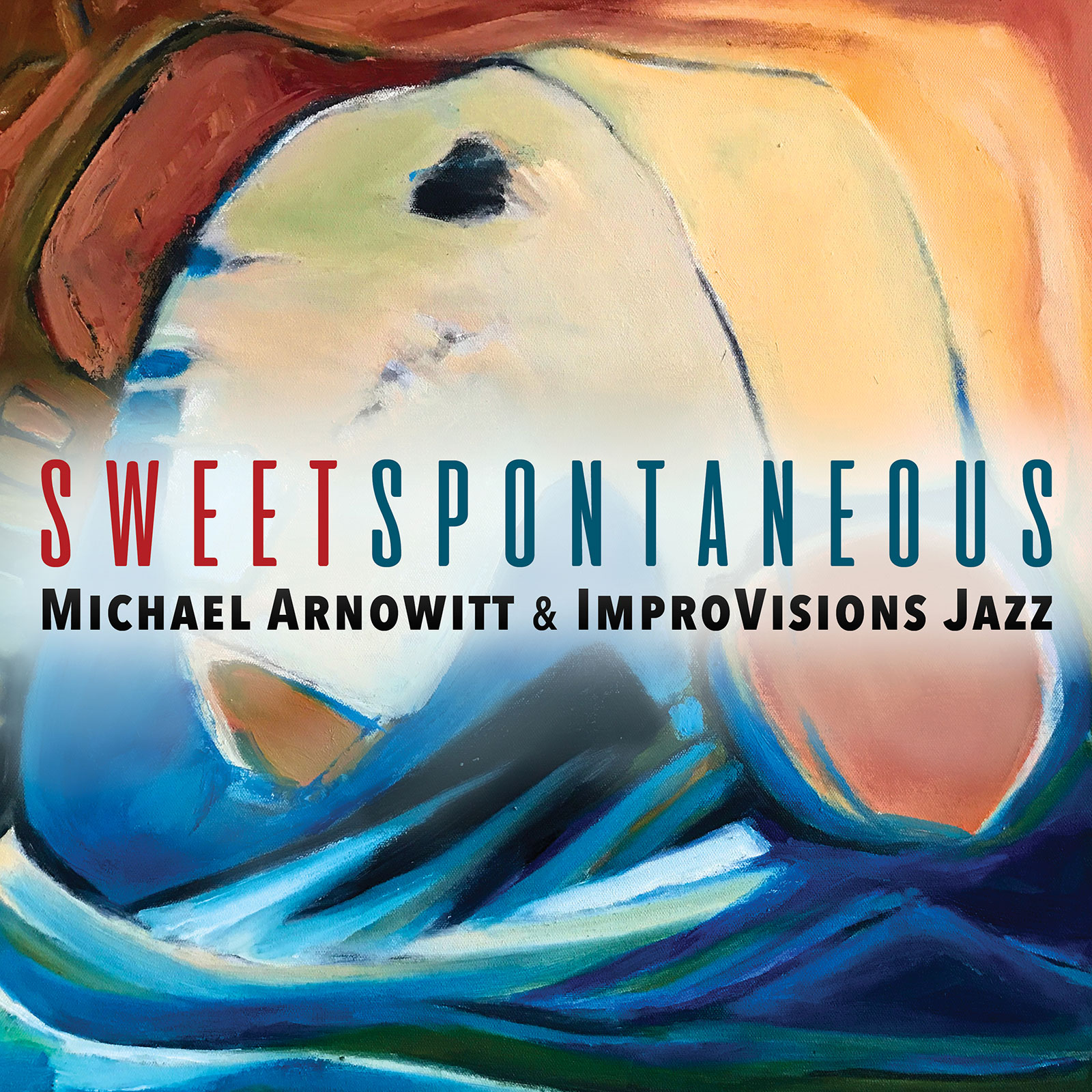
Share Album:
Sweet Spontaneous
Michael Arnowitt composer, piano
ImproVisions Jazz ensemble
Concert pianist and composer Michael Arnowitt, assisted by ImproVisions Jazz, makes his Big Round Records debut with SWEET SPONTANEOUS, the title drawn from a poem by e.e.cummings. This two-disc jazz album features 14 of Arnowitt’s own compositions with the composer himself at the piano, joined by a dozen jazz notables including Yosvany Terry on alto sax, Lucas Pino on tenor sax, Dave Smith on trumpet, and Colin Stranahan on drums.
Against the Wind, featuring vocalist Shirley Crabbe, tells the story of a woman summoning the strength to persist in the face of powerful forces. In The Crossing, bassist Rick Rosato’s accompaniment to the spoken words of a Langston Hughes poem evolves into a slow groove of brushes, keys, bass, and sax, rendering the listener completely spellbound.
Syria-us is the creative culmination of a deep study Arnowitt made of Syrian literature and music in preparation for benefit concerts he organized in 2016 to support humanitarian aid for Syrian refugees. The composer’s love of Bulgarian music is shown in Bulgarian Hoedown’s wild, exuberant fiddling and Shapka Swing, which opens with a triumphant fanfare that transitions to klezmer before emerging as the energetic gem of the album. Ascent features a reading of Maya Angelou’s celebrated poem Still I Rise combined with a flirtatious melody and syncopated accompaniment reflecting the spunkiness of both poet and poem.
With SWEET SPONTANEOUS, Michael Arnowitt encapsulates the journey of world music into jazz with dignity, class, and just the right amount of swing. The Washington Post wrote of an Arnowitt concert: “He played with an exquisite sense of touch, color and musical imagination.” Come join Michael Arnowitt as he takes us on voyages into these highly absorbing musical landscapes.
Listen
Stream/Buy
Choose your platform
Track Listing & Credits
| # | Title | Composer | Performer | |
|---|---|---|---|---|
| DISC ONE | ||||
| 01 | Against the Wind | Michael Arnowitt | Shirley Crabbe, vocals; Lucas Pino, tenor sax; Dan Silverman, trombone; Matt Haviland, trombone; Nick Grinder, trombone; Michael Arnowitt, piano; Rick Rosato, bass; Colin Stranahan, drums | 9:22 |
| 02 | Bulgarian Hoedown | Michael Arnowitt | Al Roman, violin; Dave Smith, trumpet; Tatum Greenblatt, trumpet; Dan Silverman, trombone; Matt Haviland, trombone; Nick Grinder, trombone; Michael Arnowitt, piano; Rick Rosato, bass; Colin Stranahan, drums | 11:18 |
| 03 | The Crossing | Michael Arnowitt | Therisa Rogers, spoken word; Yosvany Terry, alto sax; Michael Arnowitt, piano; Rick Rosato, bass; Colin Stranahan, drums | 11:40 |
| 04 | Migratory Mood | Michael Arnowitt | Lucas Pino, tenor sax; Dave Smith, trumpet; Dan Silverman, trombone; Michael Arnowitt, piano; Rick Rosato, bass; Colin Stranahan, drums | 8:57 |
| 05 | Syria-us | Michael Arnowitt | Yosvany Terry, alto sax; Lucas Pino, bass clarinet; Dave Smith, trumpet; Dan Silverman, trombone; Al Roman, violin; Michael Arnowitt, piano; Rick Rosato, bass; Colin Stranahan, drums | 9:47 |
| 06 | Pirouette | Michael Arnowitt | Randall Wolfgang, oboe; Dan Silverman, trombone; Michael Arnowitt, piano; Rick Rosato, bass; Colin Stranahan, drums | 6:29 |
| 07 | The Crying Candle | Michael Arnowitt | Shirley Crabbe, vocals; Al Roman, violin; Dave Smith, trumpet; Dan Silverman, trombone; Matt Haviland, trombone; Nick Grinder, trombone; Michael Arnowitt, piano; Rick Rosato, bass; Colin Stranahan, drums | 7:35 |
| DISC TWO | ||||
| 01 | Third Shift | Michael Arnowitt | Dave Smith, trumpet; Dan Silverman, trombone; Michael Arnowitt, piano; Rick Rosato, bass; Colin Stranahan, drums | 11:41 |
| 02 | Shapka Swing | Michael Arnowitt | Dave Smith, trumpet; Tatum Greenblatt, trumpet; Nick Grinder, trombone; Matt Haviland, trombone; Al Roman, violin; Lucas Pino, clarinet; Michael Arnowitt, piano; Rick Rosato, bass; Colin Stranahan, drums | 6:05 |
| 03 | Elegy for Richard | Michael Arnowitt | Lucas Pino, tenor sax; Dan Silverman, trombone; Michael Arnowitt, piano; Rick Rosato, bass; Colin Stranahan, drums | 11:22 |
| 04 | Medium Message | Michael Arnowitt | Yosvany Terry, alto sax; Dan Silverman, trombone; Michael Arnowitt, piano; Rick Rosato, bass; Colin Stranahan, drums | 9:36 |
| 05 | Ascent | Michael Arnowitt | Therisa Rogers, spoken word; Lucas Pino, tenor sax; Dave Smith, trumpet; Dan Silverman, trombone; Michael Arnowitt, piano; Rick Rosato, bass; Colin Stranahan, drums | 8:07 |
| 06 | Midnight Forest | Michael Arnowitt | Dave Smith, flugelhorn; Tatum Greenblatt, flugelhorn; Dan Silverman, trombone; Matt Haviland, trombone; Nick Grinder, trombone; Michael Arnowitt, piano; Rick Rosato, bass; Colin Stranahan, drums | 13:08 |
| 07 | Street Strut | Michael Arnowitt | Shirley Crabbe, vocals; Lucas Pino, tenor sax; Dave Smith, trumpet; Dan Silverman, trombone; Michael Arnowitt, hammond organ; Colin Stranahan, drums | 5:39 |
All compositions by Michael Arnowitt © 2017 Therisa Music (ASCAP) except musical setting to Ascent © 2017 Therisa Music (ASCAP) and Caged Bird Legacy (ASCAP)
All lyrics by Michael Arnowitt except The Crossing words by Langston Hughes,
Ascent words by Maya Angelou
All tracks recorded at Sear Sound, New York City January 10-12, 2017
Produced by Michael Arnowitt
Assistant Producers Leon Gruenbaum, Therisa Rogers
Recording Engineer Chris Allen
Assistant Engineer Owen Mulholland
Mixing/Editing Engineer Dave Darlington
Mastering Engineer Toby Mountain
Cover painting Water Music Maggie Neale
Photo Ethan Hubbard
Special thanks Jake Whitesell, Shawn White, Brad Kukenberger, Jim McMartin, Ike Mulqueen-Duquette, Liz Benjamin, Sue Bettmann, Terri Kneen, Arthur Savard, Eliza Thomas, Therisa Rogers, Leon Gruenbaum, Bodey Baker, Emily Kalina, Rich Davidian
Thanks to Harold Ober Associates for arranging permission to use the Langston Hughes poem and CMG Worldwide for arranging permission to use the Maya Angelou poem.
SOLOS / FEATURED PERFORMERS
Against the Wind
Shirley Crabbe, Lucas Pino, Colin Stranahan
Bulgarian Hoedown
Al Roman, Tatum Greenblatt, Matt Haviland, Michael Arnowitt
The Crossing
(with reading of Langston Hughes’ poem Crossing)
Therisa Rogers, Rick Rosato
Migratory Mood
Yosvany Terry, Lucas; Dave Smith, Dan Silverman
Pirouette
Randall Wolfgang, Dan Silverman, Michael Arnowitt
The Crying Candle
Shirley Crabbe, Al Roman, Michael Arnowitt
Third Shift
Dave Smith, Dan Silverman, Michael Arnowitt
Shapka Swing
Dave Smith, Nick Grinder, Al Roman, Lucas Pino
Elegy for Richard
Lucas Pino
Medium Message
Yosvany Terry, Dan Silverman, Michael Arnowitt
Ascent
(with reading of Maya Angelou’s poem Still I Rise)
Therisa Rogers, Lucas Pino, Dave Smith, Dan Silverman
Midnight Forest
Dave Smith, Matt Haviland, Michael Arnowitt, Rick Rosato
Street Strut
Shirley Crabbe, Lucas Pino
Executive Producer Bob Lord
Executive A&R Sam Renshaw
A&R Marina Altschiller
Audio Director Jeff LeRoy
Engineering Manager Lucas Paquette
Design & Marketing Director Brett Picknell
Design Ryan Harrison
Artist Information

Michael Arnowitt
Michael Arnowitt is one of the most creative and imaginative musicians of today. He is best known for his beautiful and sensitive touch at the keyboard, for the clarity and elegance of his musical ideas, for his abilities to find new articulations and colors from the piano, for his innovative and thought-provoking concert programs, and for his natural and warm on-stage manner with audiences of all ages.
Notes
Michael Arnowitt & Sweet Spontaneous
Come join pianist Michael Arnowitt and ImproVisions Jazz for a colorful journey into his unique musical landscapes. Sweet Spontaneous is a recording of 14 of Arnowitt’s jazz compositions, a major effort to present the music of this engaging new talent on the jazz scene.
Michael Arnowitt says, “We tend to listen to music in a seated, stationary position, but in reality music is all about motion and journey. To me, listening to a piece of music is like travelling through a varied landscape of rolling hills. We go up and down and round corners to see constantly changing vistas of different colors and textures.”
Take a listen to Sweet Spontaneous and enjoy a deep dive into the creative world of one of the most imaginative musicians of today.
